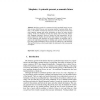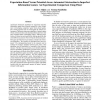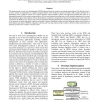494 search results - page 2 / 99 » Helping based on future expectations |
108
click to vote
INTERNET
2006
15 years 1 months ago
2006
: The huge growth of e-commerce has had a profound impact on users who can now choose from an ever increasing number of options online. Inevitably, as the number of choices has inc...
193
Voted
KES
2011
Springer
14 years 8 months ago
2011
Springer
When students study for multiple-choice cloze tests as the Test of English for International Communication (TOEIC), they tend to repeatedly tackle questions of the same type. In su...
116
Voted
AAAI
2008
15 years 4 months ago
2008
ion-Based Versus Potential-Aware Automated Abstraction in Imperfect Information Games: An Experimental Comparison Using Poker Andrew Gilpin and Tuomas Sandholm Computer Science Dep...
109
Voted
ELPUB
2007
ACM
15 years 5 months ago
2007
ACM
In Greece, there seems to be a growing level of awareness regarding open access among scholars, faculty staff and information professionals. Indeed, consensus regarding the necess...
105
click to vote
LREC
2010
15 years 3 months ago
2010
This paper presents a word sense disambiguation (WSD) approach based on syntactic and logical representations. The objective here is to run a number of experiments to compare stan...



